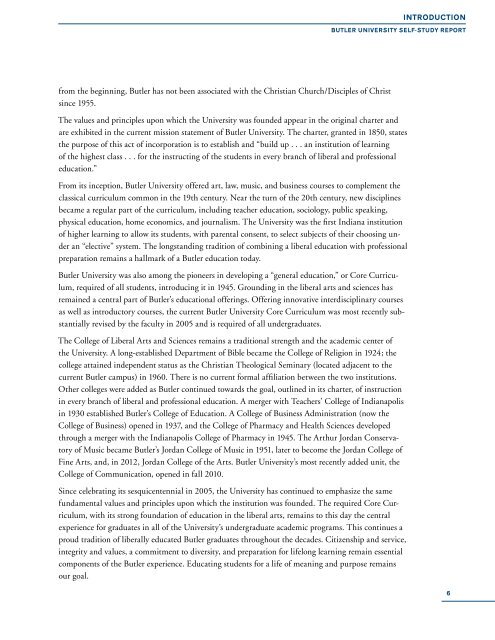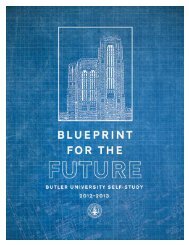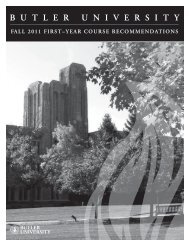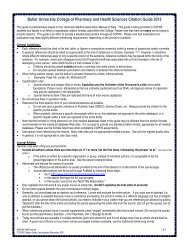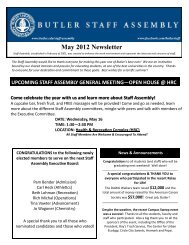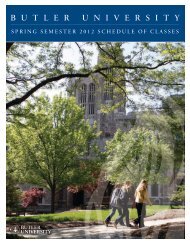Untitled - Show Answer - Butler University
Untitled - Show Answer - Butler University
Untitled - Show Answer - Butler University
Create successful ePaper yourself
Turn your PDF publications into a flip-book with our unique Google optimized e-Paper software.
INTRODUCTION<br />
BUTLER UNIVERSITY SELF-STUDY REPORT<br />
from the beginning, <strong>Butler</strong> has not been associated with the Christian Church/Disciples of Christ<br />
since 1955.<br />
The values and principles upon which the <strong>University</strong> was founded appear in the original charter and<br />
are exhibited in the current mission statement of <strong>Butler</strong> <strong>University</strong>. The charter, granted in 1850, states<br />
the purpose of this act of incorporation is to establish and “build up . . . an institution of learning<br />
of the highest class . . . for the instructing of the students in every branch of liberal and professional<br />
education.”<br />
From its inception, <strong>Butler</strong> <strong>University</strong> offered art, law, music, and business courses to complement the<br />
classical curriculum common in the 19th century. Near the turn of the 20th century, new disciplines<br />
became a regular part of the curriculum, including teacher education, sociology, public speaking,<br />
physical education, home economics, and journalism. The <strong>University</strong> was the first Indiana institution<br />
of higher learning to allow its students, with parental consent, to select subjects of their choosing under<br />
an “elective” system. The longstanding tradition of combining a liberal education with professional<br />
preparation remains a hallmark of a <strong>Butler</strong> education today.<br />
<strong>Butler</strong> <strong>University</strong> was also among the pioneers in developing a “general education,” or Core Curriculum,<br />
required of all students, introducing it in 1945. Grounding in the liberal arts and sciences has<br />
remained a central part of <strong>Butler</strong>’s educational offerings. Offering innovative interdisciplinary courses<br />
as well as introductory courses, the current <strong>Butler</strong> <strong>University</strong> Core Curriculum was most recently substantially<br />
revised by the faculty in 2005 and is required of all undergraduates.<br />
The College of Liberal Arts and Sciences remains a traditional strength and the academic center of<br />
the <strong>University</strong>. A long-established Department of Bible became the College of Religion in 1924; the<br />
college attained independent status as the Christian Theological Seminary (located adjacent to the<br />
current <strong>Butler</strong> campus) in 1960. There is no current formal affiliation between the two institutions.<br />
Other colleges were added as <strong>Butler</strong> continued towards the goal, outlined in its charter, of instruction<br />
in every branch of liberal and professional education. A merger with Teachers’ College of Indianapolis<br />
in 1930 established <strong>Butler</strong>’s College of Education. A College of Business Administration (now the<br />
College of Business) opened in 1937, and the College of Pharmacy and Health Sciences developed<br />
through a merger with the Indianapolis College of Pharmacy in 1945. The Arthur Jordan Conservatory<br />
of Music became <strong>Butler</strong>’s Jordan College of Music in 1951, later to become the Jordan College of<br />
Fine Arts, and, in 2012, Jordan College of the Arts. <strong>Butler</strong> <strong>University</strong>’s most recently added unit, the<br />
College of Communication, opened in fall 2010.<br />
Since celebrating its sesquicentennial in 2005, the <strong>University</strong> has continued to emphasize the same<br />
fundamental values and principles upon which the institution was founded. The required Core Curriculum,<br />
with its strong foundation of education in the liberal arts, remains to this day the central<br />
experience for graduates in all of the <strong>University</strong>’s undergraduate academic programs. This continues a<br />
proud tradition of liberally educated <strong>Butler</strong> graduates throughout the decades. Citizenship and service,<br />
integrity and values, a commitment to diversity, and preparation for lifelong learning remain essential<br />
components of the <strong>Butler</strong> experience. Educating students for a life of meaning and purpose remains<br />
our goal.<br />
6


